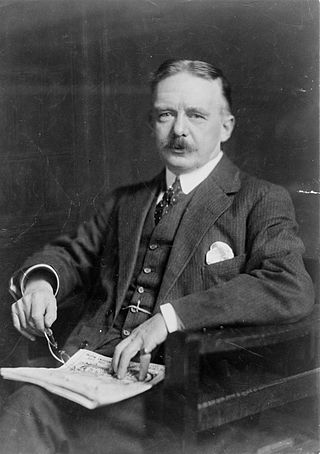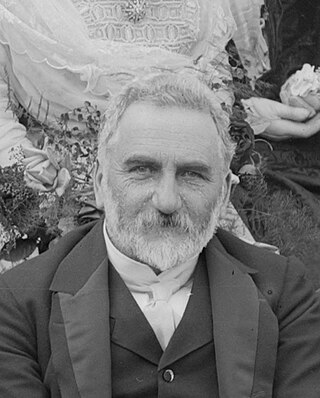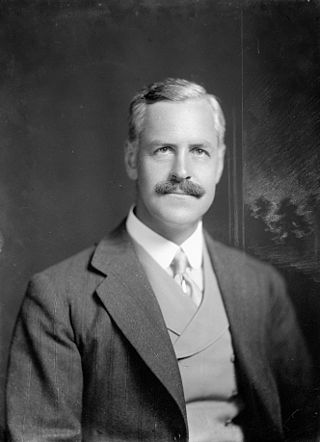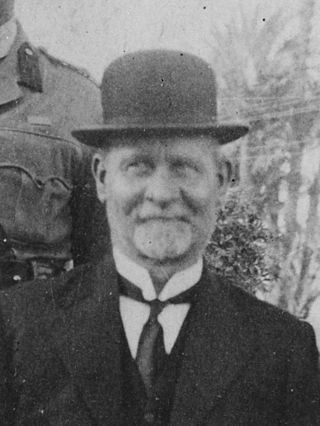| ||||||||||||||||
| Turnout | 62.35% | |||||||||||||||
|---|---|---|---|---|---|---|---|---|---|---|---|---|---|---|---|---|
| ||||||||||||||||
| ||||||||||||||||
The Otaki by-election of 1900 was a by-election during the 14th New Zealand Parliament. The election was held on 6 January following the death of Henry Augustus Field, and was won by his brother William Hughes Field.
| ||||||||||||||||
| Turnout | 62.35% | |||||||||||||||
|---|---|---|---|---|---|---|---|---|---|---|---|---|---|---|---|---|
| ||||||||||||||||
| ||||||||||||||||
The Otaki by-election of 1900 was a by-election during the 14th New Zealand Parliament. The election was held on 6 January following the death of Henry Augustus Field, and was won by his brother William Hughes Field.
The Otaki electorate became vacant following the death on 8 December of Henry Augustus Field, two days after the 1899 election. [1] Before candidates had announced themselves, it was reported that Kennedy Macdonald was considering standing for the Liberal Party. [2] The barrister Edwin George Jellicoe was also mentioned as a possible candidate. [2] [3] It was reported that it was likely that the brother of the deceased, William Hughes Field, would be asked to stand for the Liberal Party. [2] The president of the Eighty Club, T. Dwan, was mentioned as a possible candidate for the opposition. [2] The barrister Charles Morison, who had contested the 1899 general election, was a likely candidate again. [4] [5] William Field consented just after his brother's funeral, and the Liberal Party confirmed that had Field not been their candidate, they would have stood W. Ross of Upper Hutt as their candidate. [4]
The deadline for nomination of candidates was 30 December 1899. [6] In the end, only two candidates were nominated: William Field for the Liberal Party, and Charles Morison in the interests of the opposition. [5] [7]
The by-election was held on 6 January and was won by Field's brother William, [8] who during the campaign showed that he was inexperienced in politics. [9]
The following table gives the election results:
| Party | Candidate | Votes | % | ±% | |
|---|---|---|---|---|---|
| Liberal | William Hughes Field | 1,755 | 52.44 | ||
| Conservative | Charles Morison | 1,592 | 47.56 | +2.09 | |
| Majority | 163 | 4.87 | -4.18 | ||
| Turnout | 3,347 | 62.35 | -0.45 | ||
| Registered electors | 5,368 | ||||

The 1893 New Zealand general election was held on 28 November and 20 December in the European and Māori electorates, respectively, to elect 74 MPs to the 12th session of the New Zealand Parliament. The election was won by the Liberal Party, and Richard Seddon became Prime Minister.

The 1899 New Zealand general election was held on 6 and 19 December in the European and Māori electorates, respectively, to elect 74 MPs to the 14th session of the New Zealand Parliament. The election was again won by the Liberal Party, and Richard Seddon remained Prime Minister.

Robert McKeen was a New Zealand politician of the Labour Party. He was Speaker of the House of Representatives.

Charles Wilson was a New Zealand politician of the Liberal Party. He was the first chief librarian of the General Assembly Library.

Thomas William Hislop was the Mayor of Wellington from 1905 to 1908, and had represented two South Island electorates in the New Zealand Parliament.

Ōtaki is a New Zealand Parliamentary electorate, spanning part of the west coast of the lower North Island. The bulk of its population comes from the Horowhenua District, but it also takes in part of the northern Kāpiti Coast, including the towns of Ōtaki and Waikanae, and part of Paraparaumu. The current MP for Ōtaki is Tim Costley of the New Zealand National Party. He has held this position since the 2023 election.
Avon is a former New Zealand parliamentary electorate. It was created for the 1861 general election and existed until 1996. It was represented by 13 Members of Parliament and was held by Independents, Liberal Party or Labour Party representatives.

Henry James Greenslade was a Liberal Party Member of Parliament in New Zealand.
Wairau was a parliamentary electorate in the Marlborough Region of New Zealand. It was one of the initial 24 New Zealand electorates and existed from 1853 until its abolition in 1938, when it was succeeded by the Marlborough electorate. The electorate had 13 representatives during its existence. The 1861 election in the Wairau electorate was notable in that a later Premier, Frederick Weld, was unexpectedly and narrowly defeated by William Henry Eyes.

William Hughes Field was a Member of Parliament in New Zealand; first for the Liberal Party, then Independent, and then for the Reform Party. He made a significant contribution to the development of tramping in the Tararua Range.

Henry Augustus Field was a Liberal Party Member of Parliament in New Zealand. By profession a surveyor, he retired in his late 20s due to rheumatism and became a farmer. He died in office just two days after having won his second parliamentary election.
Kaiapoi was a rural New Zealand electorate, north of Christchurch in the Canterbury region of New Zealand from 1861 to 1946. It was represented by twelve Members of Parliament.

Vernon Herbert Reed was a Liberal Party and from 1912 a Reform Party member of parliament in New Zealand. He was later a member of the Legislative Council.
Mataura was a parliamentary electorate in the Southland Region of New Zealand, from 1866 to 1946.
Wellington Suburbs was a parliamentary electorate in Wellington, New Zealand. It existed from 1893 to 1902, then from 1908 to 1911, and from 1919 to 1946. The electorate was represented by six Members of Parliament.
Wellington, was a parliamentary electorate in Wellington, New Zealand. It existed from 1853 to 1905 with a break in the 1880s. It was a multi-member electorate. The electorate was represented, over the years, by 24 members of parliament.

Richard McCallum was a Liberal Party Member of Parliament in New Zealand, and later a member of the Legislative Council. A barrister from Blenheim, he held many local positions, including two years as Mayor of Blenheim. One of his main interests was the advancement of education.

Arthur Alfred Richmond Atkinson was a New Zealand barrister and solicitor, Member of Parliament and Wellington City Councillor.

Thomas Kennedy Macdonald, known as Kennedy Macdonald or Kennedy Mac, was a 19th-century Liberal Party Member of Parliament in Wellington, New Zealand.

Charles Bruce Morison, known by his first name and referred to as C. B. Morison in contemporary sources, was a New Zealand barrister and politician. He stood in two elections around the turn of the century in the Otaki electorate and was later active with the Reform Party.